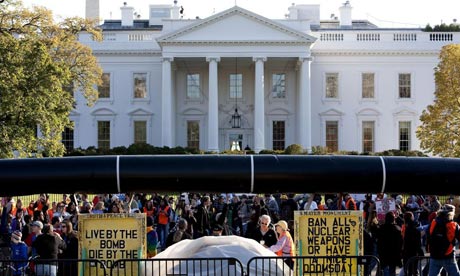http://www.commondreams.org/view/2014/01/31-6
Published on Friday, January 31, 2014 by The Guardian
A State Department report fails to take into account the full climate impacts of Keystone XL. Who is Obama protecting?
by Michael Mann

Keystone-XL-pipeline-prot-006.jpg
I have made my position on the Keystone XL pipeline quite clear. Approving this hotly debated pipeline would send America down the wrong path. The science tells us now is the time that we should be throwing everything we have into creating a clean 21st century energy economy, not doubling down on the dirty energy that is imperiling our planet.
Now that the State Department has just released a final environmental impact report on Keystone XL, which appears to downplay the threat, and greatly increases the odds that the Obama administration will approve the project, I feel I must weigh in once again.
The simple fact is this: if Keystone XL is built, it will be easier to exploit fossil fuel reserves large enough to drastically destabilize the climate. A direct pipeline to refineries and global markets makes the business of polluting the atmosphere that much cheaper and easier.
The only truly accurate examination of the pipeline would include a full cost accounting its environmental footprint. It needs to take into account how much energy is consumed in refining and transporting the crude from oil sands. It must acknowledge that the pipeline would lower the cost and raise the convenience of extracting and exporting the incredibly carbon-intensive deposits of gas.
There are two main issues at stake in the Keystone XL decision: path dependency and US leadership. Path dependency is the term use to describe the fact that once a policy is put into place, it then constrains future options to those within that policy framework. More simply, the choices we make now determine what choices we get to make in the future.
A classic example is the “qwerty” keyboard layout. Even though this layout may not be the most efficient, it was the first one, and so it became the standard. New keyboard layouts would have to compete with an established format, meaning consumers would have to adapt to a new system they had no experience with. On the basis solely of legacy, inferior standards or policies remain in place, more or less out of inertia.
So, looking through the lens of path dependency, what does the Keystone XL project look like?
It looks like decades of extracting high-CO2 fuel at a time when we should be winding down such carbon intensive resource exploitation. It looks like decades of oil spills across America’s heartland written off as an acceptable side effect of making money. It looks like decades of continued political lobbying against any CO2-limiting regulations.
If approved and built, it looks like the United State is failing to take climate change seriously by virtually guaranteeing the massive Canadian oil sands reserved are exploited. That, I’m afraid, is the real threat of Keystone XL – the loss of US status as a global leader.
As the world looks to 2015 for the establishment of legally binding emissions targets, it is looking to the US for inspiration and leadership. While opponents of carbon regulations routinely point to China and India as an excuse for further inaction, the US is still the dominant force in world politics. If Obama puts his foot down and tells us the pipeline will not be built, he will be telling the world that the United States is committed to a future powered by clean renewable energy. For better or for worse, as the US goes so goes the planet.
If the United States takes the climatologically necessary step of preventing the Keystone pipeline, it sends a message more powerful than any protest, watered down regulation or rosy proclamation. It says that business as usual is no longer an option. It says carbon pollution is a serious problem. It says that we will no longer be held hostage by ideologues demanding, “More fossil fuels, or the economy gets it!”
Protecting our planet from Keystone XL would protect US standing on the global stage, and by reassuring all nations that the United States takes climate change seriously, it would protect international negotiations from devolving into a finger pointing, blame shifting debacle. Protecting us from Keystone XL would protect us from decades of continued foreign influence on US energy policy. Protecting us from Keystone XL would protect US land from oil spills and leaks.
Most importantly, protecting us from Keystone XL would protect our atmosphere from one of the most carbon-intensive fuels ever discovered.
If the president won’t protect us, who is he protecting?
© 2014 Guardian News and Media
Michael Mann
Michael Mann is Distinguished Professor of Meteorology at Penn State University. He was recognised with other Intergovernmental Panel on Climate Change authors for their contribution to the IPCC’s 2007 Nobel Peace Prize. Follow him @MichaelEMann